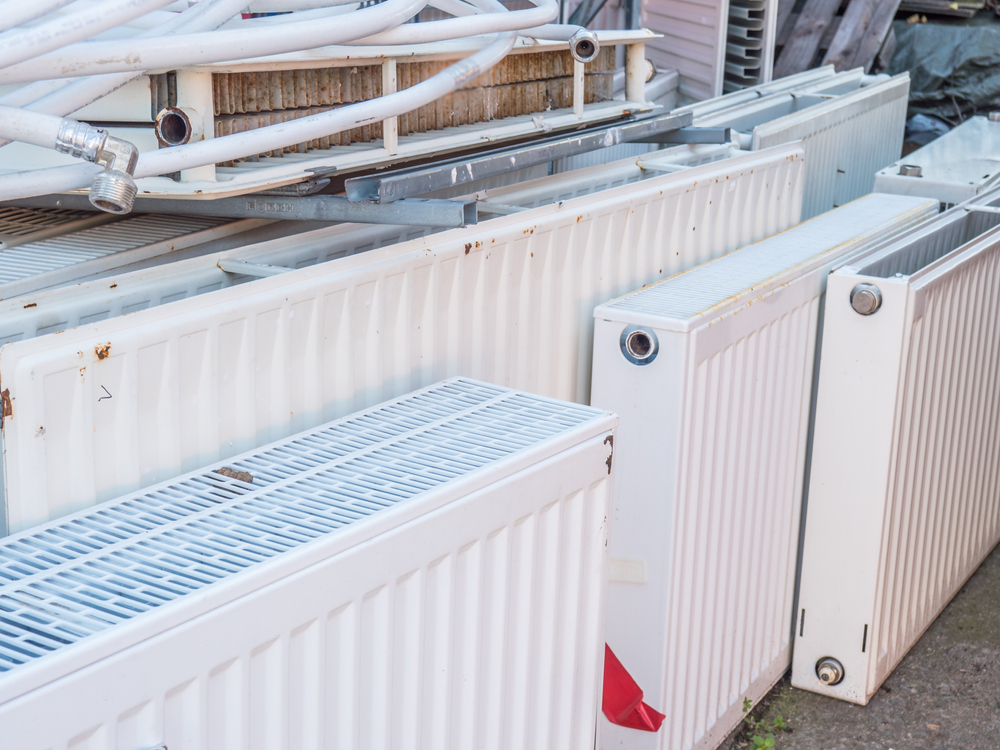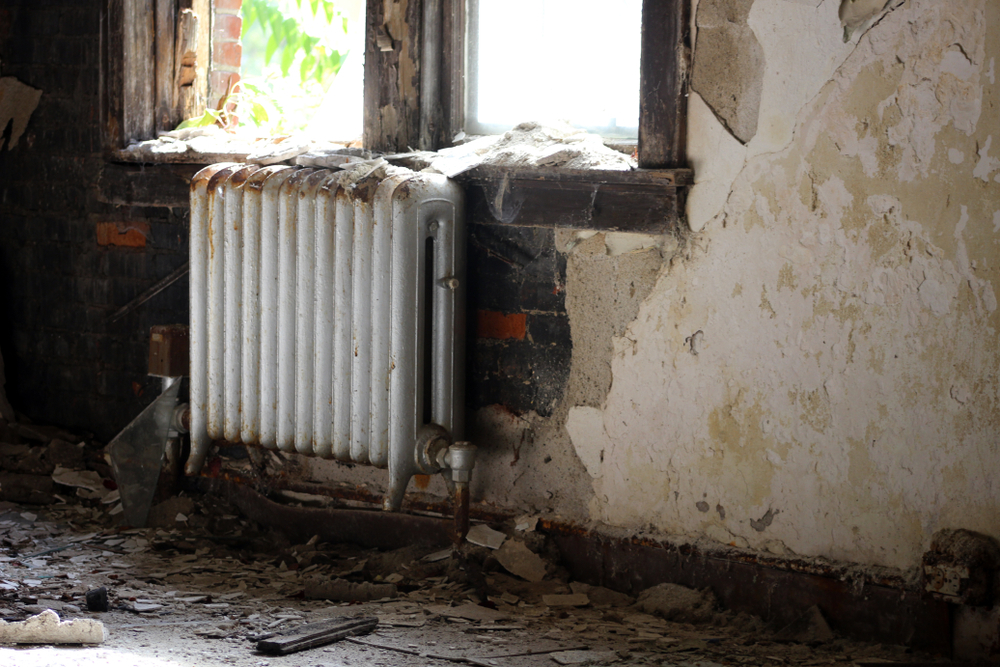Turn Old Radiators into Cash | Your Guide to Selling Scrap Radiators
When it comes to household items that have outlived their usefulness, the radiator often finds itself among the forgotten relics. But before you consider it nothing more than junk, did you know that an old radiator can hold hidden value?
In this informative guide, we’ll explore whether an old radiators has scrap value, how to sell your scrap radiator and tips for getting the best deal. We’ll also give info about different radiator types, how to prepare them for scrap, and distinguish between copper and aluminium radiators.
So, let’s turn up the heat on your knowledge and transform that dusty old radiator into cold, hard cash!
Does An Old Radiator Have Scrap Value?
You might be pleasantly surprised to discover that an old radiator can indeed have scrap value. Radiators are made from various metals, some of which are sought after in the recycling industry. Copper, aluminium, brass, and even cast iron radiators can fetch a decent price, depending on their condition and type. So, before you send your radiator to the landfill, consider giving it a chance to be reborn as recycled metal.
How To Sell Your Scrap Radiator
Before you sell your scrap radiator, you need to decide where to sell it. There are several avenues you can explore:
Online
Selling scrap radiators online can be relatively easy. You can use popular online marketplaces like eBay, Craigslist, Facebook Marketplace, or specialized scrap metal trading websites.
Online platforms offer convenience and a wider reach. Selling online means you don’t have to transport the radiators to a physical location, making it more convenient. Take clear pictures of your radiator, provide accurate descriptions, and set a reasonable price to attract buyers.
Shipping large and heavy radiators can be costly and logistically challenging, especially if they need to be transported long distances.
Scrap Metal Dealer
Selling scrap radiators to a scrap metal dealer is relatively straightforward. Once you find a reputable dealer, the process is usually quick and hassle-free. To access a scrap metal dealer, you can search online or check local directories.
Scrap metal dealers specialize in buying and selling metal scraps. Look for local dealers in your area and contact them to get a quote for your radiator. Selling to a local dealer eliminates the need for shipping, saving you time and money.
Scrap metal dealers have the expertise to assess the value of your radiators accurately. Scrap metal dealers typically offer competitive prices and can handle larger quantities of scrap. Most scrap metal dealers pay on the spot when they weigh and assess the value of your scrap radiators.
Recycling Centre
Selling scrap radiators to a recycling centre is usually straightforward, especially if you find a recycling centre that accepts and purchases scrap metal or old car radiators. Recycling centres are often distributed across cities, providing easy access for sellers. You can locate recycling centres in your area through online searches or by contacting local waste management facilities.
Recycling centres are environmentally responsible and are equipped to handle various types of scrap. While they might not offer the highest prices, selling your radiator to a recycling centre ensures that the metal gets a new lease on life.
How To Get The Best Deal

To maximize your earnings from selling a scrap radiator, consider the following factors:
1. Know The State Of Your Radiator
The state or condition of the radiator plays a crucial role in determining the best deal you can get when selling it as scrap. The better the condition, the higher the potential value. Factors to consider include:
Cleanliness: Clean radiators without excessive dirt, debris, or coolant residues are more desirable to scrap buyers.
Damage: Radiators with minimal damage, such as bent fins or minor corrosion, are more valuable than severely damaged or corroded ones.
Size: Larger radiators can fetch higher prices due to their higher metal content.
Before selling your radiators, take some time to clean them, remove any non-metallic attachments (plastic, rubber), and inspect for any visible damage.
2. Know Your Radiator Type
Different types of radiators are made from various materials, and their composition significantly impacts their scrap value. Knowing the different radiator types will help you understand what you have and negotiate a fair price with buyers. Here are the main types of radiators:
Aluminium Copper Fin (ACR)
These radiators are commonly found in air conditioning units and contain a combination of aluminium and copper. They are lightweight and have aluminium fins with copper tubes. ACR radiators generally fetch good prices due to the valuable copper content.
Aluminium Radiators
Efficient heat dissipation and lightweight design. Among the most prevalent types, we find the aluminium radiator. Widely used in automotive industries, these radiators excel in heat dissipation, making them ideal for cars and trucks. Additionally, their lightweight nature facilitates easy transport and installation. While not as valuable as ACR radiators, they still command a decent price due to the aluminium content.
Copper Radiators
Durability and longevity for industrial applications. Copper radiator proves its worth in various industrial settings. While they may be more expensive than aluminium radiators, their durability and extended lifespan make them a worthwhile investment.
Industrial applications, such as steam pipes and heat exchangers, often demand radiators capable of withstanding high temperatures, and copper radiators excel in meeting these requirements. These radiators consist mostly of copper and are highly sought after by scrap buyers for their valuable copper content.
Brass Radiators
Aesthetic appeal for vintage vehicles. Although less common than copper or aluminium radiators, brass radiators offer a distinctive charm that can add character to any space. Brass radiators stand out for their unique appearance.
Brass radiators are typically found in older vehicles and heating systems. Particularly prevalent in antique cars and vintage vehicles. They contain a combination of copper and brass. Brass radiators have some value due to the copper and brass components.
Cast Iron Radiators
Durable for industrial and commercial applications. cast iron radiators reign as the most durable option. Their robust build allows them to withstand demanding conditions, making them a staple in commercial and industrial applications where durability is crucial.
Cast iron radiators are mostly found in older buildings and heating systems. They are heavy and are composed entirely of cast iron. While they have the lowest scrap value among the radiator types, they can still be sold for scrap metal.
3. Know Your Radiator Buying Rates
Understanding the relative buying rates for different radiator types will help you prioritize which ones to sell first to get the best deal:
Copper & Brass Radiators
Copper and brass radiators typically fetch the highest prices among radiator types because of their valuable copper content. Copper is a highly sought-after metal in the scrap industry, and brass also holds good value due to its copper and zinc composition.
Aluminium Radiators
Aluminium radiators come next in terms of value. While they may not have as much value as copper and brass radiators, they still have a decent scrap value due to the aluminium content.
Cast Iron Radiators
Are cast iron radiators worth the money?
Cast iron radiators usually have the lowest scrap value compared to other radiator types. Cast iron is heavy and less valuable than non-ferrous metals like copper and aluminium.
Due to its heavy nature, recycling cast iron requires more energy compared to other metals, resulting in lower monetary returns when recycling.
How Do You Prepare Radiators For Scrap?
Preparing radiators for scrap involves several steps to ensure you maximize their value and minimize any potential hazards. Here’s a detailed guide on how to do it:
1) Sort Your Radiators Based On Materials
- Gather all the radiators you want to scrap and create a designated workspace for the process.
- Sort the radiators based on their material composition. Radiators can be made from various materials, such as copper, aluminium, brass, or steel.
- Use a magnet to identify radiators that contain steel. Steel radiators will be attracted to the magnet.
2) Cut Your Radiators & Remove Steel
- For radiators that contain steel components, use a metal saw or a cutting torch to carefully cut off the steel parts from the rest of the radiator. The steel components are usually the brackets, frames, or any other steel elements attached to the radiator.
- Once the steel parts are removed, separate them and keep them in a designated container for steel scrap.
3) Separate The Ends And Clean Fins
- Remove the plastic or rubber caps from both ends of the radiator. These caps are usually located on the top and bottom of the radiator and help seal the coolant inside.
- Use pliers or a wrench to carefully detach any brass or aluminium fittings, valves, or tubes that may be attached to the radiator ends. Keep these fittings in a separate container for their respective materials.
- Clean the fins of the radiator using a wire brush or compressed air to remove dust, debris, and any residual coolant. Removing coolant residues is essential to ensure safety and compliance with environmental regulations.
4) Scrap Your Clean Rads
- Now that you have sorted, separated, and cleaned the various components of the radiators, you can take them to a scrap yard or recycling centre.
- Check with local scrap yards to find the one offering the best price for your specific radiator materials.
- Load the sorted materials into your vehicle and take them to the scrap yard.
- At the scrap yard, they will weigh the different materials separately and pay you based on the current scrap metal prices.
Caution: Use Safety Gear for Working with Radiators

Remember to always wear appropriate safety gear, such as gloves and protective eyewear, while working with radiators, especially during the cutting process, as it involves handling sharp tools and metal components.
Copper vs Aluminium Radiators: How to Tell Them Apart
Distinguishing between copper and aluminium radiators based on colour is relatively straightforward, as they have distinct hues. Here’s how you can tell them apart:
Copper Radiators
Copper radiators have a characteristic reddish-brown colour, often referred to as copper-red. This colour is a result of the metal’s natural oxidation process. Over time, copper develops a patina that adds to its unique appearance. When identifying copper radiators, look for the following visual cues:
- Reddish-Brown Colour: Copper radiators exhibit a deep, rich reddish-brown colour that is quite distinct from other metals.
- Darker Patina: Older copper radiators might have a darker patina, which is the result of oxidation over time. This patina gives the metal an antique or weathered look.
- Weight: Copper radiators are generally heavier than their aluminium counterparts. If you can lift the radiator, the added weight can be a helpful indicator.
Aluminium Radiators
Aluminium radiators, on the other hand, have a silvery appearance. Aluminum is a lightweight metal that is widely used for various applications due to its excellent heat conductivity and corrosion resistance. When distinguishing aluminium radiators based on colour, keep the following characteristics in mind:
- Silver or Gray Color: Aluminum radiators have a silver or greyish colour that is reflective and shiny.
- Light Weight: One of the most noticeable features of aluminium radiators is their lightness compared to other metals like copper and iron.
- Smooth and Shiny Surface: Aluminum radiators usually have smooth and shiny surfaces due to their resistance to rust and corrosion.
Current Scrap Radiator Prices In Australia
Radiator scrap prices fluctuate based on market demand and metal prices. It’s crucial to check current market prices before selling your radiator.
It’s essential to check with local scrap dealers or online platforms to get the most recent pricing information for your area. Various scrap websites provide daily updates on scrap metal prices worldwide.
Do your homework and check multiple scrap-buying websites to get an idea of the market value. Get quotes from multiple buyers to ensure you get the best price.
Sell Radiators For Cash
Now that you’re equipped with the knowledge of turning your old radiator into cash, it’s time to put your plan into action.
Remember, every radiator has the potential for scrap value, and the more effort you put into preparing and identifying its type, the better deal you’ll likely get.
Choose a greener and more profitable approach to radiator disposal!


